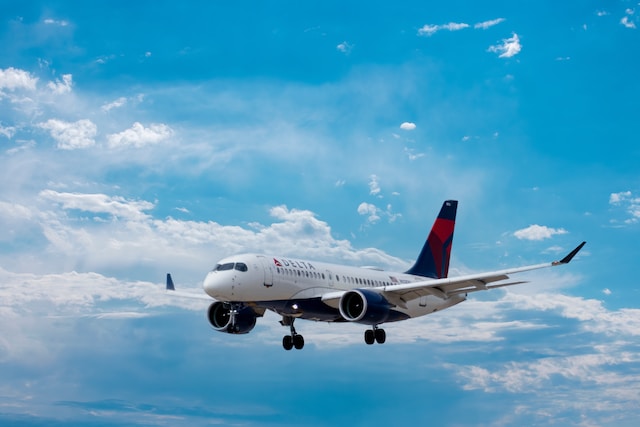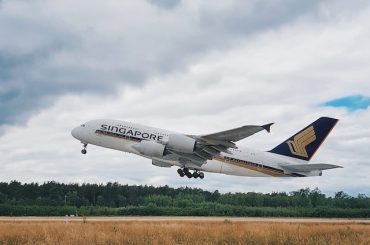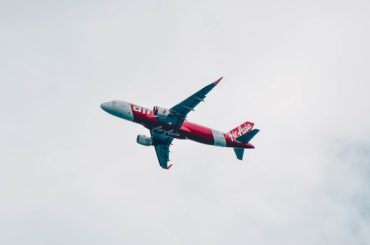Before we dive deep into the PESTEL analysis, let’s get the business overview of Delta Air Lines. Delta Air Lines, Inc. is one of the major airlines in the United States and globally. Founded in 1924, its headquarters are located in Atlanta, Georgia.
- Network & Operations: Delta operates over 5,000 flights daily and serves an extensive domestic and international network that spans six continents. It has a strong presence in North America, Europe, Asia, Africa, the Middle East, the Caribbean, and Latin America.
- Hubs: Delta’s main hubs include Atlanta (ATL), Detroit (DTW), Los Angeles (LAX), Minneapolis-St. Paul (MSP), New York-JFK, New York-LaGuardia (LGA), Salt Lake City (SLC), and Seattle (SEA).
- SkyTeam Alliance: Delta is a founding member of the SkyTeam airline alliance, which allows it to expand its reach and offer more routes and services in collaboration with other member airlines.
- Fleet: The airline has diverse fleet that includes various aircraft models from manufacturers like Boeing and Airbus.
- SkyMiles: Delta’s loyalty program, SkyMiles, allows frequent flyers to earn and redeem miles and enjoy benefits such as upgraded seating, priority boarding, and access to airport lounges.
- Financial Performance 2022: For the year, Delta delivered $45.6 billion in adjusted revenue, a $19 billion increase over the prior year, with record unit revenue performance expected to sustain a revenue premium to the industry of more than 110 percent.
Here is the PESTEL analysis of Delta Air Lines
A PESTEL analysis is a strategic management framework used to examine the external macro-environmental factors that can impact an organization or industry. The acronym PESTEL stands for:
- Political factors: Relate to government policies, regulations, political stability, and other political forces that may impact the business environment.
- Economic factors: Deal with economic conditions and trends affecting an organization’s operations, profitability, and growth.
- Sociocultural factors: Relate to social and cultural aspects that may influence consumer preferences, lifestyles, demographics, and market trends.
- Technological factors: Deal with developing and applying new technologies, innovations, and trends that can impact an industry or organization.
- Environmental factors: Relate to ecological and environmental concerns that may affect an organization’s operations and decision-making.
- Legal factors: Refer to the laws and regulations that govern businesses and industries.
In this article, we will do a PESTEL Analysis of Delta Air Lines
PESTEL Analysis Framework: Explained with Examples
Political
- Regulations and Policies: The airline industry is highly regulated. The Federal Aviation Administration (FAA) in the U.S. sets stringent regulations on safety, operations, and maintenance. Compliance with these rules is vital for Delta to maintain its flying rights and avoid penalties.
- Bilateral Air Service Agreements: International operations of airlines like Delta are often governed by bilateral or multilateral air service agreements between countries. These agreements can determine the routes Delta can operate, frequency, and even pricing in some cases.
- Security Concerns: Post-9/11, airlines, including Delta, have faced increased scrutiny and regulations concerning security. These measures have implications for operations, costs, and passenger experience.
- Political Stability: The stability of regions where Delta operates can influence its business. Political unrest, terrorism, or conflicts can lead to decreased demand for travel or even suspension of services to affected areas.
- Government Support & Bailouts: In times of crisis, like the post-9/11 period or the COVID-19 pandemic, governments worldwide, including the U.S., provided financial support to the airline industry. Delta, like other major carriers, benefited from these bailout packages.
- Infrastructure Development: Government decisions related to airport infrastructure development, expansion, or modernization can influence Delta’s operations and competitive positioning. For instance, a hub airport’s expansion can provide Delta with more slots or better facilities.
Economic
- Fuel Prices: Aviation fuel is a significant cost for airlines, including Delta. Fluctuations in oil prices can significantly impact profitability. Airlines sometimes use fuel hedging strategies to mitigate these risks.
- Economic Growth: The general economic health and growth of countries where Delta operates influence travel demand. Booming economies usually result in increased business and leisure travel, while recessions can suppress demand.
- Exchange Rates: Delta operates globally, earning revenue and incurring costs in various currencies. Fluctuations in exchange rates can influence its financial results, particularly when repatriating profits or purchasing aircraft and parts internationally.
- Inflation: Inflation rates can influence Delta’s operating costs, including labor, maintenance, and airport fees. It can also impact the purchasing power of consumers, affecting their ability to travel.
- Competition and Pricing: The economic landscape can influence the airline industry’s competition level. In challenging economic times, airlines might engage in aggressive pricing to fill seats, impacting margins.
- Tourism Trends: Economic conditions influence tourism sectors in various regions. Popular tourist destinations might change based on currency strength, economic promotion, or geopolitical stability.
- External Shocks: Events such as financial crises, pandemics (like COVID-19), or natural disasters can have sudden and profound economic impacts, disrupting airline operations and demand patterns.
Sociocultural
- Changing Travel Preferences: As societal norms and values evolve, so do travel preferences. For example, the rise of experiential travel, where travelers prioritize experiences over material goods, can influence the destinations and services Delta might offer.
- Demographics: Age distribution within the population matters. For instance, as the global population ages, there may be an increase in demand for certain travel destinations or services catering to older travelers.
- Shifts in Work Culture: The rise of remote work and digital nomad lifestyles can influence the frequency and patterns of travel. People might prioritize longer stays or more frequent short trips.
- Cultural Ties and Diasporas: The movement of people across borders, whether for work, refuge, or other reasons, creates networks of diasporas. Airlines can see increased travel between countries with strong diaspora connections.
- Lifestyle and Leisure: The value placed on leisure time and vacations in different cultures can impact the frequency and type of travel. Some societies prioritize regular vacations, while others might focus on work-centric lifestyles.
- Family Dynamics: In many cultures, family is central, leading to frequent visits to relatives, especially during festivals or special occasions. Recognizing and catering to these patterns can offer airlines like Delta a competitive edge.
- Cultural Events and Festivals: Major cultural events, festivals, or international gatherings can lead to surges in travel demand. Airlines often adjust schedules or offer promotions around such events.
Technological
- Aircraft Innovations: Advancements in aircraft design and technology, such as more fuel-efficient engines or lighter materials, can lead to cost savings and environmental benefits for airlines like Delta.
- In-flight Entertainment and Connectivity: As technology improves, passengers expect better in-flight entertainment options and robust Wi-Fi connectivity. Offering state-of-the-art systems can enhance the passenger experience.
- Booking and Ticketing Systems: The rise of online booking platforms and mobile apps has transformed ticket sales and check-in processes, making them more efficient and user-friendly.
- Automation and Robotics: At airports, automation in the form of self-check-in kiosks, baggage systems, or even robots for assistance can streamline operations and improve efficiency.
- Safety and Maintenance Technologies: Innovations in safety equipment, monitoring systems, and predictive maintenance can help airlines reduce the risk of accidents and improve aircraft uptime.
- Augmented Reality (AR) and Virtual Reality (VR): These technologies can be used for pilot training, aircraft maintenance training, or even in-flight entertainment.
- Blockchain: This technology has potential applications in ticketing, loyalty programs, and supply chain transparency, ensuring secure and transparent transactions.
- Artificial Intelligence (AI): AI can be utilized in customer service (like chatbots), operational forecasting, and optimizing flight routes and schedules.
- Cybersecurity: As the aviation industry becomes more digitally connected, investing in advanced cybersecurity measures is crucial to protect sensitive data and systems.
Environmental
- Carbon Emissions: The aviation industry significantly contributes to carbon emissions, and there’s increasing pressure from governments and consumers for airlines to reduce their carbon footprint.
- Fuel Efficiency: Investing in fuel-efficient aircraft reduces carbon emissions and leads to cost savings. Newer aircraft models offer better fuel economy, making them both environmentally and economically attractive.
- Sustainable Aviation Fuels: There’s ongoing research and development into sustainable aviation fuels (SAF) that have a lower environmental impact than conventional jet fuel. Adoption of SAF can help reduce the environmental footprint of flights.
- Waste Management: In-flight services produce considerable waste, from food packaging to disposable items. Airlines face the challenge of reducing this waste or finding more sustainable alternatives.
- Regulations: Governments and international bodies are increasingly introducing regulations to curb the environmental impact of airlines, such as emissions trading schemes or carbon taxes.
- Operational Efficiency: Techniques like single-engine taxiing or optimized flight paths can reduce fuel consumption and environmental impact.
- Infrastructure: Airports are also making efforts to become more sustainable, with initiatives like green building standards, renewable energy usage, and efficient transportation links. Airlines can benefit from and contribute to these initiatives.
Legal
- Aviation Regulations: The aviation industry is heavily regulated regarding safety, maintenance, and operations. The Federal Aviation Administration (FAA) in the U.S. and similar bodies in other countries set strict standards that airlines like Delta must comply with.
- Labor Laws: Airlines must navigate labor laws related to their employees, including pilots, cabin crew, and ground staff. Issues like working hours, overtime, benefits, and union negotiations can be pivotal.
- Consumer Protection Laws: Regulations related to passenger rights, compensation for delays or cancellations, baggage liability, and overbooking scenarios can affect an airline’s operations and financial obligations.
- Antitrust Laws: Given that the airline industry has seen numerous mergers and alliances, antitrust laws ensure fair competition and prevent monopolistic practices.
- Licensing and Certification: Airlines need various licenses and certifications to operate, from airworthiness certificates for aircraft to licenses for pilots and crew.
- International Treaties and Agreements: Bilateral and multilateral air service agreements govern international routes, frequencies, and even pricing in some instances.
- Data Protection and Privacy: With digital platforms becoming primary for bookings and customer interactions, airlines like Delta need to ensure they comply with data protection regulations, like the General Data Protection Regulation (GDPR) in the European Union.
- Taxes and Tariffs: Different countries and jurisdictions have specific tax structures related to airline operations, ticket sales, fuel, and more.
- Liability and Insurance: Regulations dictate the liability limits for airlines in case of accidents, lost baggage, or other incidents. These regulations influence the insurance coverages and premiums for airlines.











